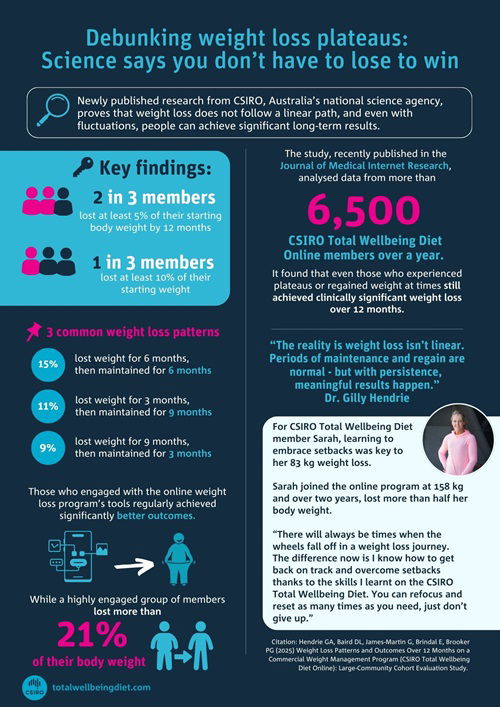Debunking weight loss plateaus: Science says you don’t have to lose to win
2nd April 2025

New research from CSIRO, Australia’s national science agency, has busted the myth that weight loss must be a linear downward trend to be successful.
The study, recently published in the Journal of Medical Internet Research, analysed data from more than 6,500 CSIRO Total Wellbeing Diet Online members over a year. It found that even those who experienced weight fluctuations or temporary plateaus – periods where little to no weight loss is recorded - were still able to achieve clinically significant weight loss over time.
Two in three members lost at least five per cent of their starting body weight by 12 months, while one in three lost at least 10 per cent of their starting weight.
The study identified the most common weight loss patterns, each including at least one three-month plateau:
- 15 per cent of members lost weight for six months, then maintained their weight for a further six months, resulting in an average 11kg weight loss after a year (12 per cent of their starting body weight)
- 11 per cent lost weight in the first three months, then maintained for nine months, losing 5 kg after a year (nearly six per cent of their starting body weight)
- Nine per cent lost weight for nine months, followed by three months of maintenance, resulting in an average 16 kg loss (17 per cent of their starting body weight).
Lead researcher, Dr Gilly Hendrie, said the findings reframe the concept of failure when it comes to weight loss.
.

The CSIRO Total Wellbeing Diet helped Sarah Wolter lose 83kg, which was more than half her body weight, over two years.
“The study gives hope to anyone who has ever felt disheartened throughout their weight loss journey,” Dr Hendrie said.
“The reality is weight loss isn’t linear. Periods of maintenance and small regains are normal - but with persistence, meaningful results can happen.”
The study found that regular engagement with self-monitoring tools - like CSIRO Total Wellbeing Diet’s meal plans, food diaries, and progress trackers - led to better outcomes.
Highly engaged members saw more than 21 per cent weight loss over 12 months
.Dr Hendrie said now is typically the time when many people hit a plateau and assume they’ve failed.
“It’s common to start strong in January, only to feel stuck by April,” she said. “But a plateau isn’t failure - it’s a sign to reset. Setting new goals, tracking food, and refocusing can make all the difference.”

Today Sarah is active, energetic, and no longer avoids photos, or feels like the odd one out in a room.
Find out more about the CSIRO Total Wellbeing Diet.
